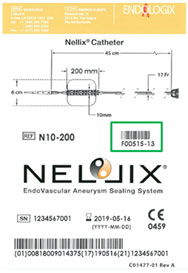
Next Generation Nellix label
showing corresponding F-level
number F00515.
Consumers and health professionals are advised that Endologix, in consultation with the TGA, is issuing a hazard alert for its Nellix EndoVascular Aneurysm Sealing System due to higher-than-expected rates of various issues identified.
Endologix is also undertaking a recall for product correction to update the Instructions for Use (IFU) regarding the indications for use, patient selection criteria and procedural best practices.
The Nellix EndoVascular Aneurysm Sealing System is used to implant material within a blood vessel to reinforce artery walls in patients with aneurysms.
The procedures are performed without the need for open surgery by internally passing instruments and materials ('stents') to the repair site via major arteries accessed near the groin.
An Endologix analysis of patient data since the system was introduced in 2013 showed higher-than-expected rates of leaks around the implant, device movement and aneurysm enlargement.
Currently, there are two versions of the Nellix System available, distinguishable via the product labelling. The label on the catheter package shows an 'F-level number' as shown in the accompanying image. For the more recent Nellix device (referred as the 'Next Generation Nellix'), the F-level number starts with F00515 irrespective of stent length. All other F-level numbers correspond to the earlier version of the device (referred to as Nellix 3SQ+).
Information for consumers
If you, or somebody you provide care for, has received treatment using the Nellix EndoVascular Aneurysm Sealing System, be alert to these issues.
All patients undergoing this type of treatment require life-long, regular follow-up to assess their health and the performance of their implant. Patients with specific clinical findings (for example, leakage around the implant, enlarging aneurysms or changes in the structure or position of the implant) should receive enhanced follow-up.
If you have undergone endovascular surgery and do not know what type of implant was used, or if you have any other questions or concerns, contact your treating specialist or the hospital at which the surgery was undertaken.
Information for health professionals
If you are treating a patient who has received treatment using the Nellix EndoVascular Aneurysm Sealing System, be alert to this issue.
Refer them to their treating specialist if they have any questions or concerns.
Information for physicians
Endologix has written to all specialists undertaking procedures with the Nellix EndoVascular Aneurysm Sealing System to provide more details about these issues.
Endologix recommends that all patients should be advised that endovascular treatment requires life-long, regular follow-up to assess their health and the performance of their endovascular implant. Patients with specific clinical findings (e.g., endoleaks, enlarging aneurysms or changes in the structure or position of the endovascular implant) should receive enhanced follow-up.
Additional endovascular intervention or conversion to standard open surgical repair should be considered for patients continuing to experience enlarging aneurysms, implant displacement, and/or significant endoleaks during post-operative follow-up. An increase in aneurysm size and/or persistent endoleak may lead to aneurysm rupture.
Endologix will provide additional training on the key IFU changes.
For further information contact Endologix's local representative Maquet on 02 8874 3100.
Reporting problems
Consumers and health professionals are encouraged to report problems with medical devices. Your report will contribute to the TGA's monitoring of these products. For more information see the TGA Incident Reporting and Investigation Scheme (IRIS).
The TGA cannot give advice about an individual's medical condition. You are strongly encouraged to talk with a health professional if you are concerned about a possible adverse event associated with a medical device.

